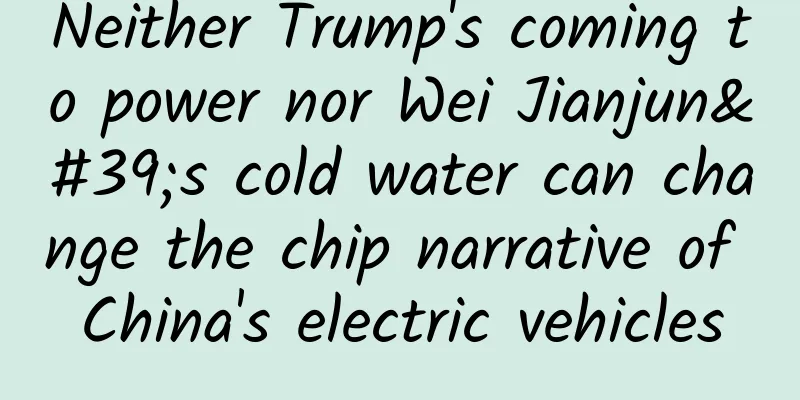Neither Trump's coming to power nor Wei Jianjun's cold water can change the chip narrative of China's electric vehicles

|
The US presidential election has come to an end. At 78, it is the right age to strive for success. Trump got the "offer" again, and his mentality is really incomparable to that of ordinary people. Of course, this is also inseparable from Musk's "big gold coin". According to a previous report by The Hill, Musk began supporting Trump in July and invested at least $118 million, playing a key role in canvassing votes in swing states. On the day of his election, Tesla (TSLA) stock price closed at $284.6, a new high since July 2023, and its total market value reached $900 billion. Musk posted on social media that day that "the future will be bright" and attached a photo of a rocket launch. It can be seen that Musk is very satisfied with this result. Tesla's stock price soared, and domestic Tesla concept stocks also benefited from it. Related stocks in the Hong Kong stock market opened higher the next day. In China, companies in Tesla's localization industry chain such as Fuyao Glass, Baolong Technology, Sanhua Intelligent Control, Joyson Electronics, and Top Group also rose in response. However, these positive effects are limited to Tesla concept stocks. Judging from Trump's consistent strategy, his victory is not actually that positive for the electric vehicle industry. As early as August this year, Trump said that if he was elected, he would end the $7,500 federal tax credit for electric vehicles, and bluntly stated that "tax credits and tax incentives are generally not a good thing." Coincidentally, Musk has also called for "taking away subsidies." Regardless of whether Musk supports Trump or not, it is certain that after Trump takes office, the global auto industry is likely to face the risk of tariff threats and reductions in electric vehicle subsidies, which is obviously not a good thing for Chinese automakers that are actively planning globalization. But there is more to pay attention to. The "chip problem" faced by Chinese automakers may become more serious due to Trump's coming to power. Since the Trump administration came to power in 2017, one of their main focuses has been to increase tariffs to protect the domestic manufacturing industry and to trigger Sino-US trade frictions. Many people may still remember that in July 2018, the United States accused China of unfair trade practices that harmed the U.S. semiconductor industry and imposed a 25% tariff on semiconductor materials and equipment imported from the mainland. In addition, since 2018, the United States has also imposed export controls and economic sanctions on mainland companies and institutions, such as Huawei and ZTE, and stopped Chinese companies from acquiring large U.S. chip companies on the grounds of national security, curbing the development of our chip industry. Judging from Trump’s attitude before he took office and the trade frictions on chips launched by the United States in recent years, if Trump uses tariffs and other means to exert pressure in the future, Chinese automakers will still be at risk of being "choked" by chips. Wei Jianjun, the head of Great Wall Motors, has previously said that according to data from the Ministry of Industry and Information Technology, more than 90% of China's automotive chips have to be imported, especially for many emerging brands. In other words, after Trump takes office, the "chip narrative" of China's new energy vehicle companies may be more cruel than before. Although Wei Jianjun poured cold water on Chinese automakers over the chip issue at the time, domestic chips have also been accelerating breakthroughs in recent years and have achieved good results. For example, Shanghai Microelectronics' domestically produced 28nm lithography machine has reached the fourth-generation light source level, which is of great significance for improving the domestic mid-range chip manufacturing capabilities. Although the global semiconductor industry has made a distinction between chips, with those above 28nm considered advanced and those below 28nm considered mature, China’s new energy vehicle production and sales currently account for about 60% of the world’s total, and more than 96% of demand is for 28nm mature process chips. This means that if China has increasingly strong mature process production capabilities, Chinese automakers basically don’t need to worry too much about being “choked” by chips. In addition, China's semiconductor industry has also made more progress in breaking through technological bottlenecks. For example, the 504-bit superconducting quantum computing chip "Xiaohong" developed by USTC Guodun Quantum Technology Co., Ltd. has set a new record for domestic superconducting quantum computing chips; the ice engraving technology developed by West Lake University has simplified the chip manufacturing process, improved production efficiency, and provided an innovative path for chip manufacturing; domestic companies such as Tsinghua Unigroup have made progress in the fields of DRAM and NAND Flash storage chips, reducing dependence on external supplies. All of the above represent that the overall strength of the domestic chip industry is constantly improving. It can be seen that Wei Jianjun's "chip cold water" is indeed cold enough to serve as a warning to Chinese automakers, but it is also a bit exaggerated. We do not deny that domestically produced cars still have a certain degree of "dependence" on imported chips. After Trump takes office, he will most likely continue to use the "three axes" of "tariffs, blacklists, and national security" to continue to curb the development of Chinese automakers. However, with the continuous advancement of technology and the continuous expansion of the market, the independent leading capabilities of Chinese companies are constantly enhanced, and it is only a matter of time before domestically produced chips "break through". Technology cannot be truly "blocked". Even if Trump comes to power, all good news will be directed towards Tesla, but the pen that writes the "chip narrative" of China's new energy vehicle companies cannot be left to Trump. At least, with the rise of the domestic chip industry, part of this pen is now in our own hands, isn't it? As a winner of Toutiao's Qingyun Plan and Baijiahao's Bai+ Plan, the 2019 Baidu Digital Author of the Year, the Baijiahao's Most Popular Author in the Technology Field, the 2019 Sogou Technology and Culture Author, and the 2021 Baijiahao Quarterly Influential Creator, he has won many awards, including the 2013 Sohu Best Industry Media Person, the 2015 China New Media Entrepreneurship Competition Beijing Third Place, the 2015 Guangmang Experience Award, the 2015 China New Media Entrepreneurship Competition Finals Third Place, and the 2018 Baidu Dynamic Annual Powerful Celebrity. |
<<: India wants to make iPhones? Apple has seven requirements
>>: Summary of new features in iOS 10.3: AirPods can also locate and sound when lost
Recommend
WeChat launches new feature "Friends Message", but 60% of users say they don't like it
Recently, some netizens revealed that WeChat is t...
A brief analysis of mobile Internet advertising fraud methods. How to prevent it?
1. Causes of Cheating Here I would like to first ...
Comprehensive analysis of how the treasure hunting platform conducts "category operation"
Operations generally consist of content operation...
New knowledge: How to counterattack and play Douyin on several mobile phones on June 11 (explaining account maintenance and PR editing + personal summary)
New knowledge: How to counterattack and play Douy...
The new coronavirus JN.1 variant is coming? This little thing must be done well
Recently, a wave of new coronavirus infections ha...
Will the more online promotion channels there are, the better the campaign results will be?
Let me answer the question in the title first: Wr...
How difficult is it for Tianwen-1 to accomplish three major tasks at one time?
At 12:41 on July 23, my country's first Mars ...
How did one line of copywriting for Melatonin sell products worth 10 billion yuan?
In terms of marketing ability, Shi Yuzhu can defi...
How to improve the opening rate of APP activity push?
Activity push is an important way for products to...
How can products get more users to pay? Share 3 tips!
When a product enters the mature stage and has en...
Hongrong A-shares Earning Money Required Course 16 Videos
Hong Rong's A-shares money-making compulsory c...
Complete tutorial for Kuaishou operation! (Personal account)
1 The predecessor of Kuaishou, called "GIF K...
The sweetness that you can't let go of, is it all the taste of sugar?
Author: Ju Peng, Zhang Ling (Kunming Institute of...
How to do topic marketing on Chinese Valentine’s Day?
Today we will learn about topic marketing in 5 mi...









